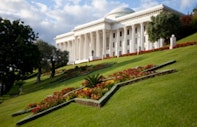What Bahá’ís Believe
Bahá’u’lláh and His Covenant
The Universal House of Justice
Quotations
- What Bahá’ís Believe
- Overview
- Bahá’u’lláh and His Covenant
- The Life of the Spirit
- God and His Creation
- Essential Relationships
- Universal Peace
- What Bahá’ís Do
Through its communications the Universal House of Justice provides analysis, vision and direction to help the growing global Bahá’í community to participate in the building of a world civilization. Among these is a letter addressed to the Bahá’í community on the first day of Ridván each year—which generally falls on 20 or 21 April—known as the Ridván message. From time to time, the Universal House of Justice also addresses messages to the wider society, offering perspectives on issues of concern to the well-being of the planet.
Below are a few brief extracts from messages of the Universal House of Justice. A much wider collection can be found on the Bahá’í Reference Library.
Disunity is the crux of the problems which so severely afflict the planet. It permeates attitudes in all departments of life. It is at the heart of all major conflicts between nations and peoples. More serious still, disunity is common in the relations between religions and within religions, vitiating the very spiritual and moral influence which it is their primary purpose to exert.
The Bahá’í community has labored assiduously within the framework of the global Plans issued by the House of Justice and has succeeded in establishing a pattern of Bahá’í life that promotes the spiritual development of the individual and channels the collective energies of its members towards the spiritual revival of society. It has acquired the capacity to reach large numbers of receptive souls with the message, to confirm them, and to deepen their understanding of the essentials of the Faith they have embraced. It has learned to translate the principle of consultation enunciated by its Founder into an effective tool for collective decision-making and to educate its members in its use. It has devised programs for the spiritual and moral education of its younger members and has extended them not only to its own children and junior youth but also to those of the wider community. With the pool of talent at its disposition, it has created a rich body of literature which includes volumes in scores of languages that address both its own needs and the interest of the general public. It has become increasingly involved in the affairs of society at large, undertaking a host of projects of social and economic development…It has made significant strides in multiplying its human resources through a program of training that reaches the grassroots of the community and has discovered methods and instruments for establishing a sustainable pattern of growth.
Thousands upon thousands, embracing the diversity of the entire human family, are engaged in systematic study of the Creative Word in an environment that is at once serious and uplifting. As they strive to apply through a process of action, reflection and consultation the insights thus gained, they see their capacity to serve the Cause rise to new levels. Responding to the inmost longing of every heart to commune with its Maker, they carry out acts of collective worship in diverse settings, uniting with others in prayer, awakening spiritual susceptibilities, and shaping a pattern of life distinguished for its devotional character. As they call on one another in their homes and pay visits to families, friends and acquaintances, they enter into purposeful discussion on themes of spiritual import, deepen their knowledge of the Faith, share Bahá’u’lláh’s message, and welcome increasing numbers to join them in a mighty spiritual enterprise. Aware of the aspirations of the children of the world and their need for spiritual education, they extend their efforts widely to involve ever-growing contingents of participants in classes that become centres of attraction for the young and strengthen the roots of the Faith in society. They assist junior youth to navigate through a crucial stage of their lives and to become empowered to direct their energies toward the advancement of civilization. And with the advantage of a greater abundance of human resources, an increasing number of them are able to express their faith through a rising tide of endeavours that address the needs of humanity in both their spiritual and material dimensions.
Children are the most precious treasure a community can possess, for in them are the promise and guarantee of the future. They bear the seeds of the character of future society which is largely shaped by what the adults constituting the community do or fail to do with respect to children. They are a trust no community can neglect with impunity. An all-embracing love of children, the manner of treating them, the quality of the attention shown them, the spirit of adult behavior toward them—these are all among the vital aspects of the requisite attitude. Love demands discipline, the courage to accustom children to hardship, not to indulge their whims or leave them entirely to their own devices. An atmosphere needs to be maintained in which children feel that they belong to the community and share in its purpose.
The perpetuation of ignorance is a most grievous form of oppression; it reinforces the many walls of prejudice that stand as barriers to the realization of the oneness of humankind, at once the goal and operating principle of Bahá’u’lláh’s Revelation. Access to knowledge is the right of every human being, and participation in its generation, application and diffusion a responsibility that all must shoulder in the great enterprise of building a prosperous world civilization—each individual according to his or her talents and abilities. Justice demands universal participation. Thus, while social action may involve the provision of goods and services in some form, its primary concern must be to build capacity within a given population to participate in creating a better world.
Throughout human history, interactions among [the individual, the institutions, and the community] have been fraught with difficulties at every turn, with the individual clamouring for freedom, the institution demanding submission, and the community claiming precedence. Every society has defined, in one way or another, the relationships that bind the three, giving rise to periods of stability, interwoven with turmoil. Today, in this age of transition, as humanity struggles to attain its collective maturity, such relationships—nay, the very conception of the individual, of social institutions, and of the community—continue to be assailed by crises too numerous to count. The worldwide crisis of authority provides proof enough. So grievous have been its abuses, and so deep the suspicion and resentment it now arouses, that the world is becoming increasingly ungovernable—a situation made all the more perilous by the weakening of community ties.
Every follower of Bahá’u’lláh knows well that the purpose of His Revelation is to bring into being a new creation. No sooner had “the First Call gone forth from His lips than the whole creation was revolutionized, and all that are in the heavens and all that are on earth were stirred to the depths.” The individual, the institutions, and the community—the three protagonists in the Divine Plan—are being shaped under the direct influence of His Revelation, and a new conception of each, appropriate for a humanity that has come of age, is emerging. The relationships that bind them, too, are undergoing a profound transformation, bringing into the realm of existence civilization-building powers which can only be released through conformity with His decree.
The Great Peace towards which people of good will throughout the centuries have inclined their hearts, of which seers and poets for countless generations have expressed their vision, and for which from age to age the sacred scriptures of mankind have constantly held the promise, is now at long last within the reach of the nations. For the first time in history it is possible for everyone to view the entire planet, with all its myriad diversified peoples, in one perspective. World peace is not only possible but inevitable. It is the next stage in the evolution of this planet…
Banning nuclear weapons, prohibiting the use of poison gases, or outlawing germ warfare will not remove the root causes of war. However important such practical measures obviously are as elements of the peace process, they are in themselves too superficial to exert enduring influence…A genuine universal framework must be adopted.
With every day that passes, danger grows that the rising fires of religious prejudice will ignite a worldwide conflagration the consequences of which are unthinkable. Such a danger civil government, unaided, cannot overcome. Nor should we delude ourselves that appeals for mutual tolerance can alone hope to extinguish animosities that claim to possess Divine sanction. The crisis calls on religious leadership for a break with the past as decisive as those that opened the way for society to address equally corrosive prejudices of race, gender and nation. Whatever justification exists for exercising influence in matters of conscience lies in serving the well-being of humankind. At this greatest turning point in the history of civilization, the demands of such service could not be more clear. “The well-being of mankind, its peace and security, are unattainable”, Bahá’u’lláh urges, “unless and until its unity is firmly established.”
More from the Writings of the Universal House of Justice…
You can find out more about the major statements of the Universal House of Justice and its Constitution in the Articles and Resources section.







